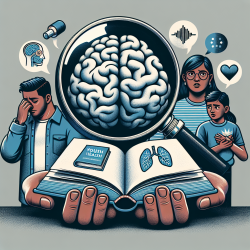Introduction
In the realm of speech-language pathology, understanding the multifaceted influences on child development is crucial. Recent research titled Impacts of Parental Burnout on Chinese Youth’s Mental Health: The Role of Parents’ Autonomy Support and Emotion Regulation provides valuable insights into how parental burnout can affect youth mental health. This blog aims to guide practitioners in applying these findings to enhance their practice and encourage further exploration into this critical area.
Understanding Parental Burnout and Its Impacts
Parental burnout is characterized by overwhelming exhaustion due to parenting responsibilities, leading to emotional distancing from children. The study highlights that parental burnout can significantly impact youth mental health, contributing to increased depressive and anxiety symptoms over time. This underscores the importance of addressing parental burnout to foster better mental health outcomes for children.
The Role of Autonomy Support
The research identifies autonomy-supportive parenting as a mediating factor in the relationship between parental burnout and youth mental health. Autonomy support involves allowing children to make decisions and considering their perspectives. Practitioners can encourage parents to adopt autonomy-supportive practices, which can mitigate the negative impacts of burnout on children.
Emotion Regulation as a Protective Factor
Effective emotion regulation, particularly cognitive reappraisal, can buffer the adverse effects of parental burnout. Cognitive reappraisal involves reinterpreting situations to alter emotional responses. Practitioners should guide parents in developing these skills, as they can maintain positive parenting practices even under stress.
Practical Applications for Practitioners
- Educate Parents: Provide workshops or resources on the importance of autonomy-supportive parenting and emotion regulation.
- Develop Intervention Programs: Create programs that focus on enhancing parents' emotion regulation skills, particularly cognitive reappraisal.
- Collaborate with Schools: Work with educators to identify signs of parental burnout and its effects on students, fostering a supportive environment for children.
Encouraging Further Research
While this study provides valuable insights, it also opens avenues for further research. Practitioners are encouraged to explore how these findings apply in different cultural contexts and over longer periods. Understanding these dynamics can lead to more tailored interventions that address the unique needs of diverse populations.
Conclusion
The findings from this research highlight the critical role of parental burnout in youth mental health and the protective effects of autonomy support and emotion regulation. By integrating these insights into practice, speech-language pathologists can better support children and their families, fostering healthier developmental outcomes. To read the original research paper, please follow this link: Impacts of Parental Burnout on Chinese Youth’s Mental Health: The Role of Parents’ Autonomy Support and Emotion Regulation.










